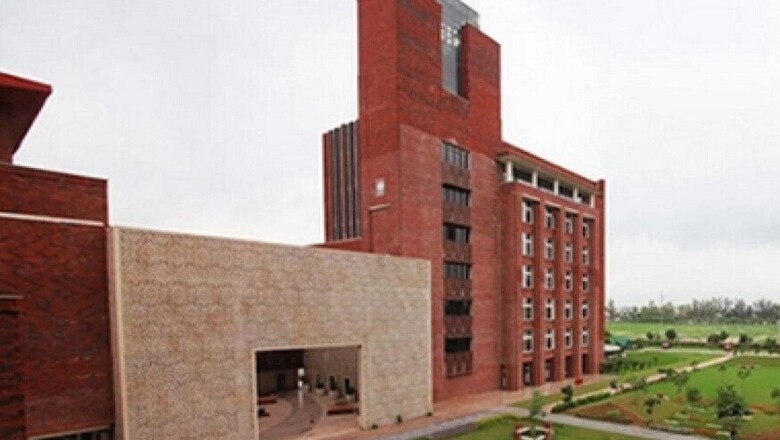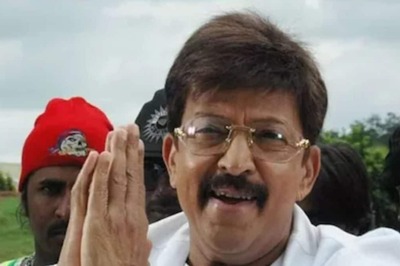As Covid-19 Halts Ivy League Aspirations, Home-grown Private Universities Stand up as 'Alternatives'

views
There was no dearth of recommendation letters for some of the bright Indian students planning to pursue quality education in the United States.
The COVID-19 crisis has put their Ivy League plans on hold. The letters are now comforting notes of their talent. But all is not lost, as a handful of Indian universities, perceived by some to be equivalent of Ivy League schools, are offering “quality education at lesser fees, in times of changed circumstances due to COVID-19”.
News18.com spoke to the vice-chancellors of these universities and other educationists on what lies ahead as the dream of studying abroad takes a backseat for students.
'Liberal Education in Private Universities Attractive for Students'
COVID-19 has imposed challenges on higher-education institutions across the world. The Ivy League colleges are also going through a tough time in trying to cope with the unprecedented conditions.
The vice-chancellor of Shiv Nadar University, Rupamanjari Ghosh, said that it is ultimately a question of high-quality education — both in content and delivery. And the added advantage in a place like Shiv Nadar University in India, she said, is the affordability of this quality education.
Considering these parameters, Ghosh said, her university is a suitable alternative to the Ivy League institutes. While talking about content delivery, she said, “Traditional 'Liberal Arts' is not restricted to just ‘arts’ subjects, it includes science and mathematics. It is thus 'Liberal Studies' that allows a student to follow 'liberal' pursuits, free of boundaries, and aims to break the mould of education in silos.”
From the beginning, said Ghosh, her university realised the importance of a broad-based, comprehensive education in today's context and started offering “what I call an integrated STEAM education (a combination of STEM and Art & Design), which is poised to transform the economy of the 21st Century, just as science and technology did in the last century with STEM”. This is the future of ‘liberal arts’ education, she said, “and that future is already being taught at SNU".
The vice-chancellor of Ashoka University, Malabika Sarkar, said that the Covid-19 pandemic has made many Indian students reconsider their overseas education plans but they have a reason to be relieved. “Fortunately, they have the option of applying to places like Ashoka University for their higher education. We are seeing evidence in our ongoing admissions process that they are taking up that option,” she said.
Ashoka is India’s premier Liberal Arts and Sciences institution, and provides a similar quality of education for which students would get abroad, at a significantly lower cost, said Sarkar. They have world-renowned faculty members who have PhDs from, and have taught at, the world’s best universities, she added. “The university provides a Liberal Arts and Sciences education on par with that which students would get in the West, at a lower cost,” Sarkar said.
The university also provides financial aid to students who cannot afford their higher education. “For the last couple of years, we have been seeing the trend that students who earlier used to go to the West for their education are now seeing premier institutions such as Ashoka as the natural destination, as awareness has risen that an Ashoka education is on par with recognised global best practices,” said Sarkar.
Some of these private elite universities offering liberal studies and education have always been in touch with the changing academic demands of the 21st century, as Sarkar added, “Ashoka provides breadth in education and depth in learning. In addition to receiving a broad-based liberal arts education, students get to choose their major and switch majors if they need to. They also have the choice to major in interdisciplinary specialisations.”
With the lure of liberal studies attracting students to other higher education institutions, OP Jindal Global University is open to the change in demands. "Changing academic demands are a reflection of the myriad challenges facing the world today. We intend to continue to address these challenges through new programmes in environment and sustainability as well as psychology and mental health," said Arya B Majumdar, Dean, Admissions and Outreach.
The university has already partnered with over 250 universities worldwide and its students regularly engage in student mobility programmes such as summer abroad programmes, semester exchange and dual degree programmes. "Moving forward, we do expect to build more partnerships in terms of numbers and engagement," he said.
'New Elite Campuses Offering Hybrid Solution'
Shiv Nadar University had realised the gravity of the situation early, and moved all courses to online mode on March 16, 2020, even for students who were still on campus, during the spring semester break the previous week, Ghosh said. “Agility has been the key to be able to plan and face the challenges optimistically. Our courses, industry and academia talks, concerts and club activities have all moved to different online platforms,” she said.
The faculty has ensured the continuity of teaching-learning and engagement of students while keeping their health, wellness and career opportunities in mind. The focus has been minimum loss of time in the semester. The SNU plans to start the next session on August 3, 2020.
In this mode of delivery and even otherwise, what has always been central in their thinking is the "student experience", said Ghosh. In this time the faculty gained a remarkable understanding of digital delivery. They found that their students are dying to come back to the campus. “Students pay tuition fees in the Ivy League schools and elsewhere to get enriching campus experience, socialising and learning with peers,” she said and added, “This experience is central to education. But now with digital transactions everywhere, students are missing this more than ever. It is becoming clear that the hybrid or blended model is here to stay.”
Shiv Nadar University is not going to outsource teaching, which carries its brand, but will use the best of professionally developed digital quality content and physical hands-on learning in its laboratories and studios for a functional hybrid model, Ghosh said. The focus is on reliable testing, enhanced partnerships with international universities in SNU.
The handful of universities promising liberal studies and arts have focused on the seamless delivery of education. Recently, Ashoka was awarded the E-Learning Excellence for Academic Digitisation (E-LEAD) certification by QS-IGAUGE, a renowned global college and varsity rating initiative, as shared by the V-C of the university.
Apart from being swift in their response to the Covid-19 pandemic, campus hygiene, safety of students and staff, they ensured no interruption in teaching learning experience, said Sarkar. With these new challenges “Ashoka began online classes from mid-March itself, ensuring seamless academic continuity without the loss of even one day of studies” she said, informing that they have also upgraded internet plans at no cost for students who are on 100% financial aid, in order for them to access classes from their hometowns and villages. “Sessions are also recorded for students to access later. The university is equipped to continue hosting classes and providing other services online for a prolonged period of time, if deemed necessary,” said Sarkar.
Much like other universities, OP Jindal Global University has also moved its classes and modes of learning online. It is one of the few universities to have received the E-Learning Excellence for Academic Digitisaton (E-LEAD) Certification from the coveted QS IGAUGE for E-learning excellence. "This certification means that JGU is now a globally recognised higher education institution to offer online education programmes benchmarked with best global practices," said Majumdar. It is making preparations to ensure social distancing both within and outside the classroom.
Tweaks in Admission for New Crowd
There is evidence that those who preferred going to USA for education have thought about applying in these universities like OP Jindal, Ashoka, KREA and Shiv Nadar. This is clearly the fallout of the fact that Ivy League schools in the US are not above the pandemic. “These institutions are also going to recalibrate themselves in the new scenario. For many, financial sustenance comes from hefty fees paid by a large number of international students. Some of the Indian alternatives to them charge much less for the courses they offer,” said Ghosh.
Those who do not want to leave the country for an uncertain and expensive education outside can join the "institution of eminence". But there won’t be an increase in seats.
For the candidates who were outbound, SNU has expanded and modified its undergraduate admission process. This is the first time that domestic candidates can apply through their original college board SAT scores. Their own online admission tests (SNU-SAT & APT) for the academic session 2020-21 are being remotely proctored, using an AI mechanism that is secure and ensures anti-cheating surveillance.
Additionally, students scoring above 80 percentile in the Joint Entrance Exam (JEE) Mains are eligible to apply directly into the School of Engineering and School of Natural Sciences.
In Ashoka, they have a holistic admissions process, “involving not just the student’s academic performance but also their co-curricular and extracurricular activities, as well as an on-the-spot essay and interview", said the V-C
Sarkar added, “Importantly for students who had planned to go abroad, we recognise SAT and ACT scores and can make an offer of admission without waiting for their Board results.”
Ashoka university has partnerships with close to 20 top global universities including Yale, UPenn, UMichigan, Duke, King’s College London, Sciences Po, HEC Paris, and many others.
This gives their students unmatched access to exchange programmes, summer abroad programmes and semester abroad programmes, the V-C said. As the world deals with the pandemic, collaborations with international universities for purposes such as research in domains ranging from biosciences to economics can help strengthen the response of India and the world to Covid-19, she said.
OP Jindal's administration is expecting "similar to the Great Recession of 2008-09 the lack of employment opportunities in the west, particularly in the US, will be crucial in students’ aspiration to study and eventually work abroad. Instead, we envisage that Indian students will continue studying in India and choose to pursue higher education abroad in later years," added Majumdar.
'We Need More HEIs to Serve as Ivy League Alternatives'
As per Quacquarelli Symonds (QS), the educational rankings agency, nearly half of the students around the world with plans to study abroad are considering deferment. This also revealed that a fifth of them are considering finding an alternative destination or drop the plans altogether.
The AISHE report 2019 tells us that there are 385 universities which are privately managed out of the 993 universities in the country. The total enrolment in higher education has been estimated to be 37.4 million. Gross Enrolment Ratio (GER) in Higher education in India is 26.3%, which is calculated for the 18-23 years age group.
According to the 2019 Open Doors Report on International Educational Exchange, for six years the total number of Indians pursuing higher education in the United States has grown steadily. From 2018 it recorded an increase of almost three per cent.
“We need large number of good quality higher education institutions (HEIs) to absorb the teeming aspirations of students dropping the plans to study in an Ivy League college. In fact, many of them left for an HEI in the US because of lack of such HEIs here and not having got admission in any of the handful that currently exist in our country,” said Associate Professor Rishikesh BS in the School of Education of Azim Premji University.
He added, “The number of students wanting to go out has increased every year as per the higher education surveys. Now, if all of them start looking for admissions within the country due to the pandemic, I don’t see wide enough absorption capacity within the country currently.”
In his view, even if the current good quality HEIs increase their admission quota (so far they are not) it will not be sufficient unless the entire higher education system raises its quality. The crisis, he believes, can change some things at a faster pace, “and there can be an opportunity to overhaul the system leading to establishment of good quality private HEIs that are not commercial ventures and at the same time transform the public universities into high quality ones by reforming the governance and regulation structures”.
Rishikesh said, “In this dearth of Indian Ivy League schools, the real hope is in our public universities. They will have to transform and make themselves attractive for which one of the key aspects is to situate the entire higher education system within the country in a liberal education framework as suggested by the draft of New Education Policy 2019.”
In fact, he added, “Many students go outside the country seeking such a liberal education environment. This liberal education framework makes universities outside attractive to our students, so if we transform our system in that manner we could also become attractive.”
Rishikesh said he understands that this entails not only operating under a liberal education framework, it also brings in many other critical changes. For instance, this transformation would entail greater financial and administrative autonomy for public universities.
“For private universities also to follow that model it requires rethinking and infusion of funds. So the downside of this autonomy and transformation could mean higher expenses and thereby higher per student cost. Therefore, it is crucial that a large number of scholarships should be made available by the government and the private HEIs should be mandated to provide freeships and scholarships to a certain percentage of their admission intake,” he said.
Currently, though there are hundreds of private universities in the country, most do not match the global standards, Rishikesh said, adding that a lot of them are market-driven and education is a commercial concept. Many of them are single-discipline institutions, and they lack the physical and mental space, thought and vision, he said. “However, other than the few very good ones, there are also many private HEIs in the middle rung that are performing alright which the government should encourage along with making the public universities high-quality institutions,” he added.
The idea of a liberal education framework that offers integration of courses, rigorous exposure to different disciplines from arts and humanities to the sciences, mathematics and other professional fields, flexible curricular structures which allow for creative combinations of study, integration of vocational education and multiple entry/exit points needs to be pursued in all HEIs, in his opinion.
The central universities understand they have to rise to the occasion and face the kind of challenges private universities are giving to them and at the same time curb the trend towards privatisation and ensure quality education with government funds.
Delhi University Teachers' Association president Rajib Ray said that a government-funded institute has no replacement as "generations have benefitted from it without having any care of how much our parents earned and how big their pockets are, which is an impossible scenario in any other model of education".
Academia has to evolve with time and, he said, “For adapting to changed times we need grant from the government and resources. Many of the institutes have the brand name and image that doesn’t change with even NAAC scores.”
He added, “In public-funded institutes it doesn’t matter how large the pockets of my students or their parents are. In other institutes, it matters. These elite private colleges are regarded as better ones, affordable by only a particular segment. But in our country we need the system that only cares about the grades of the student.”
For him, the rightful struggle for government resources must be upped as “any effort for the government to move out of funding public education is allowing the private players gain momentum at our cost”.
















Comments
0 comment